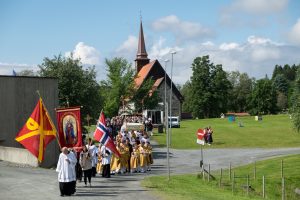Life Illumined
New Evangelisation – Towards 2030
St Olav died a martyr’s death in 1030. We are approaching the millennial anniversary. It occasions a fair amount of perplexity, even controversy. How can we as Catholics get ready for it? This was the subject of a talk I gave in the Bridgettine convent at Tiller this evening. You can watch and listen to it (in Norwegian) here, where you will likewise find EWTN’s report:
At the solemn Mass in Nidarosdomen this summer, on the feast of St Olav, Bishop Erik remarked: ‘the National Jubile intends, as an institution, to home in on ‘social sustainable strength in society’, leading up to a resounding Hurrah! for the existence of our nation.’ The Catholic Church, he went on to say, cannot be satisfied with this. We must go deeper:
Let us hold firm to what is palpable and real in the legacy of St Olav and leave it to the secular authority to bask in fantastical abstractions. The National Jubilee is said to ‘value difference’. The state quite naturally construes difference horizontally. To follow the vertical axis open towards heaven, to understand and communicate St Olav’s life and death as an encounter with the categorically Other, the Source of life, is our task, our responsibility.
How is this supposed to happen? In a conference at Birgittaklosteret on 4 November, on the feast day of St Charles Borromeo, the bishop fleshed out his idea. He set out from the collect for the day:
Preserve in the midst of your people,
we ask, O Lord, the spirit with which you filled
the Bishop Saint Charles Borromeo,
that your Church may be constantly renewed
and, by conforming herself to the likeness of Christ,
may show his face to the world.
He pointed out that renewal is not necessarily about being turned into something else; it is about being formed by a God who, by definition, makes ‘all things new’ (Revelation 21.5). By means of radical conversion we are called to be remade in Christ’s image. Our task as Church, as Christians, is not to impose ourselves on the world but to reveal Christ’s face to it. The patrimony of St Olav can be read in this light, which likewise enables us to identify our own present task
St Charles Borromeo (1538-84) was a bishop in a time of decadence. As archbishop of Milan he followed the reforming vision of the Council of Trent, a vision that in a few decades renewed the Church. It bore fruit in learning, culture, charitable work, and sanctity. Charles, the bishop said, traced out four principal areas of enterprise: reform of the liturgy, so that Catholics everywhere might be nurtured by the Church‘s christocentric worship without being subject to the whims and preferences of individuals; reform of the priesthood and consecrated life, in view of a new culture of vocation; instruction of the laity through catechesis and studies, for it is vital that the faithful, in times of forgetfulness and strife, can give a rational defence of the hope that is in them (cf. 1 Peter 3.15); and effective charitable work, to look after those who fall between the stools of societal structures.
Charles insisted that enterprise in all these areas must be soaked in prayer:
We must pray before, during and after everything we do.
The bishop said he wishes to stress these same areas in the time leading up to the millennial anniversary of the Battle of  Stiklestad. The chief motivation of our prelature for 2030, he said, will be the renewal of our baptismal commitment. The jubilee is not about being retrospective or self-congratulatory. It is important that we know the story of St Olav in depth. We cannot just sit silently and watch when it is being reduced to silly commonplaces.
Stiklestad. The chief motivation of our prelature for 2030, he said, will be the renewal of our baptismal commitment. The jubilee is not about being retrospective or self-congratulatory. It is important that we know the story of St Olav in depth. We cannot just sit silently and watch when it is being reduced to silly commonplaces.
At the heart of the jubilee, though, will be our own responsibility for what Olav represented: responsibility to ensure that the Gospel of Jesus Christ is preached integrally and lived credibly in this country. We, too, are called to reveal Christ’s face to the world. Also for us the task will find articulation through liturgical prayer, a renewed culture of vocation, solid catechesis, and charitable work. When these four areas are harmonised, effective mission ensues.
This was the bishop’s main point: Our task in the years leading up to 2030 is to become an ever more evangelising Church. In this respect we all have a contribution to make, a responsibility to assume.
The bishop cited the poet Olav Aukrust. In a speech given in Lom on the feast of St Olav in 1929, Aukrust spoke of the programme of St Olav and insisted: ‘This is something quite other than wasting one’s energies in egoistical, narrow-minded party politics.’ It is a matter of laying a new foundation for communion, of enabling prospect in Christ Jesus.
So here we have the contours of a genuine programme: The National Jubilee in 2030 will be focused on the renewal of our baptismal commitment as we assume responsibility for the deposit of faith entrusted to us. The process will be a function of evangelisation and will find expression through the liturgy, a renewed culture of vocation, catechesis, and charitable work.
Bishop Erik summons us all to creative initiative in a plurality defined by unity, enabled by prayer ‘before, during and after everything we do.’
There is excitement in this proposition – and promise!

